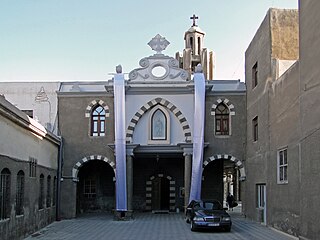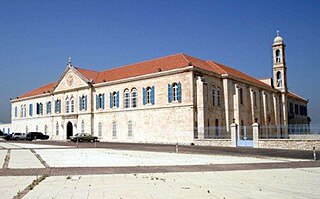Princes of Antioch
- John of Lusignan (died 1375), regent of Cyprus
- John of Coimbra, Prince of Antioch (died 1457), husband of Charlotte of Cyprus
- John II of Cyprus (died 1458), king of Cyprus, Armenia and Jerusalem
John of Antioch may refer to:

The Syriac Catholic Church is an Eastern Catholic Christian originating in the Levant that uses the West Syriac Rite liturgy and has many practices and rites in common with the Syriac Orthodox Church. Being one of the twenty-three Eastern Catholic Churches, the Syriac Catholic Church is a self-governed sui iuris particular church church while it is in full communion with the Holy See and entirety of the Catholic Church.
Jacob Baradaeus, also known as Jacob bar Addai or Jacob bar Theophilus, was the Bishop of Edessa from 543/544 until his death in 578. He is venerated as a saint in the Oriental Orthodox Churches and his feast day is 31 July. Jacob's missionary efforts helped establish the non-Chalcedonian Syriac Orthodox Church, also known as the "Jacobite" Church after its eponymous leader, and ensured its survival despite persecution.
Patriarch of Antioch is a traditional title held by the bishop of Antioch. As the traditional "overseer" of the first gentile Christian community, the position has been of prime importance in Pauline Christianity from its earliest period. This diocese is one of the few for which the names of its bishops from the apostolic beginnings have been preserved. Today five churches use the title of patriarch of Antioch: one Oriental Orthodox ; three Eastern Catholic ; and one Eastern Orthodox.

The Greek Orthodox Patriarchate of Antioch, also known as the Antiochian Orthodox Church and legally as the Greek Orthodox Patriarchate of Antioch and All the East, is an autocephalous Greek Orthodox church within the wider communion of Eastern Orthodox Christianity. Headed by the Greek Orthodox patriarch of Antioch, it considers itself the successor to the Christian community founded in Antioch by the Apostles Peter and Paul.
Ignatius is a male given name of presumed Latin or Etruscan origin.

Alphabetical list of Eastern Christianity-related articles on English Wikipedia

The West Syriac Rite, also called Syro-Antiochian Rite, is an Eastern Christian liturgical rite that employs the Divine Liturgy of Saint James in the West Syriac dialect. It is practised in the Maronite Church, the Syriac Orthodox Church, the Syriac Catholic Church and various Malankara Churches of India. It is one of two main liturgical rites of Syriac Christianity, the other being the East Syriac Rite.
Sergius was the name of a Roman Patrician Gens, Sergia, originally from Alba Longa. It is also found as Sergios. It may refer to:
Athanasios, also transliterated as Athnasious, Athanase or Atanacio, is a Greek male name which means "immortal". In modern Greek everyday use, it is commonly shortened to Thanasis (Θανάσης), Thanos (Θάνος), Sakis (Σάκης), Nasos (Νάσος), Athan (Αθαν) or Athos (Aθως).
John III of the Sedre was the Patriarch of Antioch and head of the Syriac Orthodox Church from 631 until his death in 648. He is commemorated as a saint by the Syriac Orthodox Church, and his feast day is 14 December.
Michael the Syrian ,(Classical Syriac: ܡܺܝܟ݂ܳܐܝܶܠ ܣܽܘܪܝܳܝܳܐ, romanized: Mīkhoʾēl Sūryoyo), died 1199 AD, also known as Michael the Great or Michael Syrus or Michael the Elder, to distinguish him from his nephew, was a patriarch of the Syriac Orthodox Church from 1166 to 1199. He is best known today as the author of the largest medieval Chronicle, which he wrote in the Syriac language. Some other works and fragments written by him have also survived.
Paul II the Black, also known as Paul of Bēth Ukkāme, was the Patriarch of Antioch and head of the Syriac Orthodox Church from c. 551 or 564 to his deposition in 578. He succeeded Sergius of Tella as the spiritual leader of the Syrian non-Chalcedonians, in opposition to the Chalcedonian Imperial Church, and led the nascent Syriac Orthodox Church as it endured division and persecution.
Sergius of Tella was the Patriarch of Antioch and head of the Syriac Orthodox Church from c. 544 to c. 547 or c. 557 to 560.
Julian II, also known as Julian the Roman or Julian the Soldier, was the Patriarch of Antioch and head of the Syriac Orthodox Church from 687 until his death in 708.
Patriarch Athanasius may refer to:
John VIII bar Abdoun was the Patriarch of Antioch, and head of the Syriac Orthodox Church from 1004 until his death in 1033.
Athanasius III was the Patriarch of Antioch and head of the Syriac Orthodox Church from 724 until his death in 739/740.

The Maronite Church is an Eastern Catholic sui iuris particular church in full communion with the pope and the worldwide Catholic Church, with self-governance under the Code of Canons of the Eastern Churches. The current head of the Maronite Church is Patriarch Bechara Boutros al-Rahi, who was elected in March 2011 following the resignation of Patriarch Nasrallah Boutros Sfeir. The current seat of the Maronite Patriarchate is in Bkerke, northeast of Beirut, Lebanon. Officially known as the Antiochene Syriac Maronite Church, it is part of Syriac Christianity by liturgy and heritage.